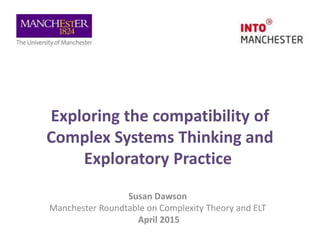
Exploratory practice, complexity and elt
- 1. Exploring the compatibility of Complex Systems Thinking and Exploratory Practice Susan Dawson Manchester Roundtable on Complexity Theory and ELT April 2015
- 2. Outline 1. Complex Systems Thinking, Exploratory Practice and me 2. Complex Systems Thinking and Exploratory Practice in the classroom
- 3. My story as a practitioner … It’s all about ME! It’s all about the LEARNERS! Who’s it all about?
- 4. Discovering Exploratory Practice The seven principles: 1. Put ‘quality of life’ first. 2. Work primarily to understand language classroom life. 3. Involve everybody. 4. Work to bring people together. 5. Work also for mutual development. 6. Integrate the work for understanding into classroom practice. 7. Make the work a continuous enterprise. Sustainability Collegiality Understanding Quality of Life (Allwright 2003: 128-130)
- 5. Discovering Complex Systems Thinking Classroom as a complex adaptive system (Burns and Knox , 2011)
- 6. ‘Light bulb’ moment It’s all about US! Complexity thinking … 'as a way of thinking and acting’ (Davis and Sumara, 2006: 18) collective possibility AND self-interest (Davis and Sumara, 2006: 85)
- 7. EP and CST compatible? ‘Education – and, by implication, educational research – conceived in terms of expanding the space of the possible rather than perpetuating entrenched habits of interpretation, then, must be principally concerned with ensuring the conditions for the emergence of the as-yet unimagined’ (Davis and Sumara, 2006: 135, Italics mine)
- 8. Our story EUS 9/PG Prep
- 9. Exploratory Practice in action Puzzles about their language learning lives Investigate those puzzles – come to the best understanding they can Dissemination
- 10. Bert, Eshrag and Bena’s puzzle Why do I always speak English in wrong grammar, although I know how to use grammar?
- 11. Why I chose this puzzle … (self-interest) When I was talking with others I was always thinking about what to say and how to say. I could make others understand me, but I didn’t do well in the grammar. If I wanna speak in right grammar, I may have to correct it several times. When talking, this is impossible. When I was writing, I could do better than speaking. I can find the wrong and have time to correct it. But, what can I do when I am speaking? (Bert)
- 12. Why I chose this puzzle … (self-interest) I have chosen this puzzle because I was also in trouble with this puzzle. Sometimes, I could not create complex sentences when I spoke because I didn’t know how to apply the grammar to use. Moreover, I always speak just a present simple tenses, whereas, I know the structure of many tense. (Bena)
- 13. Collective possibilities (expanding the space of the possible) Don’t be shy to speak with others, especially the native speakers. Do more practice – we can speak mother tongue language because we speak it everyday for long time, the foreign language will be better if we do more practice everyday. Learn more vocabulary because its very useful to create the sentences.
- 14. Final reflections (expanding the space of the possible) It has helped me know that our puzzle was very common for everyone. Bert I learnt how … can I deal with other students and know about their problems. Eshrag After I had analysed my data, I had found new puzzles … Bena
- 15. EP and CST compatible? ‘Education – and, by implication, educational research – conceived in terms of expanding the space of the possible rather than perpetuating entrenched habits of interpretation, then, must be principally concerned with ensuring the conditions for the emergence of the as-yet unimagined’ (Davis and Sumara, 2006: 135, Italics mine)
- 16. Crunch point The puzzle work isn’t helpful We find out the puzzles, but cannot find out the solutions It wastes a lot of time to research puzzles It does not help us with our goals (IELTS) It does not fit to our level
- 17. Emergence and freedom ‘Critical education guides learners by presenting them with alternatives which complicate the scene, unsettling the doings and understandings of others. It intentionally opens up the spaces of the possible.’ (Kramsch, 2012: 18) ‘Fear of Freedom’ and ‘Security of Conformity’ (Freire, 1970)
- 18. Learners Personal goals Language learning experience Classroom External pressures Attitudes and beliefs Institutional policy My learners as a complex adaptive system (adapted from Burns and Knox, 2011)
- 19. Questions for discussion 1. What is the value for language education of ‘expanding the space of the possible’? 2. How may we create ‘conditions for the emergence of the as-yet unimagined’?
- 20. References • Burns, A., & Knox, J. S. (2011). Classrooms as Complex Adaptive Systems: A Relational Model. TESL-EJ, 15(1). Retrieved from http://www.tesl-ej.org/wordpress/issues/volume15/ej57/ej57a1/ • Davis, B., & Sumara, D. J. (2006). Complexity and education: Inquiries into learning, teaching, and research. New York: Routledge. • Freire, P. (1970/2006). Pedagogy of the oppressed. London: Continuum. • Kramsch, C. (2012). Why is everyone so excited about complexity theory in applied linguistics? In Mélanges CRAPEL (Vol. 33). Retrieved from http://www.atilf.fr/IMG/pdf/02.pdf